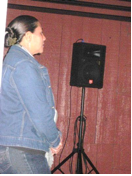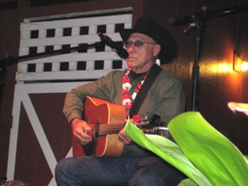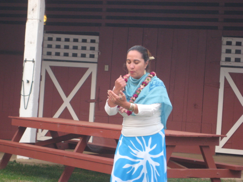Bill Garcia Paniolo
Talk Story April 12, 2012


Someone else he learned from was Jimmy Dowsett. “I see Uncle Jimmy Dowsett in the audience (applause). I used to ride nana ʽaina (look at the land), nana pa (fence line)and nana wai (water) down at the Mahiki area down where the golf course is. The main road cuts that golf course from mauka land, but that mauka land was all one land going down. Every Saturday, six years of age on my horse, I’d be waiting for Uncle Jimmy to show up at the second gate so we could go together and nana ʽaina. That was a special time Uncle Jimmy.” (The time period spoken of here was from 1955 to 1956. Jimmy Dowsett was a foreman of the 2nd gate area of Parker Ranch and every Saturday he would make his weekend rounds on the lands he oversaw in what was and still is referred to as the Second gate section of Parker Ranch.)
Bill’s paternal grandparents immigrated from Spain, but his father Joe was born on Maui. Joe started working in the Hawaii sugar industry as an agriculturist with the Hawaiian Sugar Planters Association (HSPA) and then went to work in that capacity with the former Hakalau Sugar Plantation on the Hamākua coast. After a time, he then became the Industrial Relations Superintendant. He is well known for that work and the many years he served in the House of Representatives in the Hawaii Territorial government and then as a representative in the State of Hawaii legislature. He was known as a fair man who cared about the makaʽāinana. Bill grew up with strong connections to the land and an awareness of the socio-political environment, which is reflected in the first song he shared.

| Kaulana nâ pua a`o Hawai`i Kûpa`a ma hope o ka `âina Hiki mai ka `elele o ka loko `ino Palapala `ânunu me ka pâkaha Pane mai Hawai`i moku o Keawe Kôkua nâ Hono a`o Pi`ilani Kâko`o mai Kaua`i o Mano Pa`apû me ke one Kâkuhihewa `A`ole a`e kau i ka pûlima Ma luna o ka pepa o ka `ênemi Ho`ohui `âina kû`ai hewa I ka pono sivila a`o ke kanaka `A`ole mâkou a`e minamina I ka pu`u kâlâ o ke aupuni Ua lawa mâkou i ka pôhaku I ka `ai kamaha`o o ka `âina Ma hope mâkou o Lili`ulani A loa`a ê ka pono o ka `âina *(A kau hou `ia e ke kalaunu) Ha`ina `ia mai ana ka puana Ka po`e i aloha i ka `âina *Alternate Stanza | Famous are the children of Hawai`i Ever loyal to the land When the evil-hearted messenger comes With his greedy document of extortion Hawai`i, land of Keawe answers Pi`ilani's bays help Mano's Kaua`i lends support And so do the sands of Kakuhihewa No one will fix a signature To the paper of the enemy With its sin of annexation And sale of native civil rights We do not value The government's sums of money We are satisfied with the stones Astonishing food of the land We back Lili`ulani Who has won the rights of the land *(She will be crowned again) Tell the story Of the people who love their land *Alternate Stanza |
Bill’s next song, Wahine Ilikea, takes us to Molokaʽi where he and his wife Chris began their married life together. “The area that we were in and where I built the ranch house is a place called Kamalo. Kamalo is in essence the heart of Moloka’i. It’s almost equidistant, Kamalo to Maunaloa on the West side, Kamalo to Puʽu o Hoku on the East side. We were considered more on the East end. Below Puʽu o Hoku Ranch was the valley of Halawa and this particular song that I’m going to sing references Halawa being the home of the visitor, a lush land and Puʽu o Hoku land is very much like Waimea land. I spent a lot of time on Puʽu o Hoku Ranch, on my off days hunting, in fact in the first months of my married life my wife and I ate only venison and wild goat… When I first got there, I had $50 in my pocket. They had 2 markets in town, Misaki Market and the Friendly Market. So we walk into Misaki and walk out of there with no money in my pocket and 2 brown grocery bags and not a lick of meat. So she tells me, she says, “What are we going to do?” I said don’t worry, I’ll take care of this.
After using his credit card to purchase a chest freezer, he went hunting and came home with two deer. “I asked my wife to bring out the old sheets and wrapped the venison in the sheets and let em cool over night. About 6:00 in the morning I shake her and say, ‘Hey, come on get up.’ She says, ‘Ah, it’s Saturday.’ ‘I know get up, we got work to do. We got to butcher these animals.’ She says, ‘I don’t know how to do that.’ I said, ‘I do, so you get up, you hold, I cut, you wrap and you write what I tell you on the bag, on the wrapping.’ So that’s what we did.”
The inspiration for Wahine Ilikea (White-skinned Woman) was a water source on Molokaʽi close to the ranch where Bill and Chris lived. “If you look straight up to the mountains there’s 3 water sources up there and always there were white clouds that surrounded that particular area. It was pretty far up. When I was looking for a water source, I went up there with my workmen, and we hiked all the way up. It was an all-day deal then. This song was written by Dennis Kamakahi ; he wrote this in 1975, the year we left Molokaʽi to go to Oʽahu where I went to law school. For him, the white clouds represented the fair skinned woman that was overlooking the source of life, the 3 water sources there in the bosom of Molokaʽi and I sing this because my wife and I started our married life there and whenever I sing this song I think of her.”
| Hui: Pua kalaunu ma ke kai `O Honouliwai Wahine `ilikea i ka poli `o Moloka`i Nö ka heke Nani wale nö nä wailele `uka `O Hina `o Hähä `o Mo`oloa Nä wai `ekolu i ka uluwehiwehi `O Kamalö i ka mälie Nani wale no ka `äina Hälawa Home ho`okipa a ka malihini `Äina uluwehi i ka noe ahiahi Ua lawe mai ka makani Ho`olua | Chorus: Crown flower by the shore Of Honouliwai Fair skinned woman in the bosom of Moloka`i Is the best Beautiful waterfalls of the upland Hina, Hähä and Mo`oloa The three waters in the verdant overgrowth Of Kamalö, in the calm Beautiful is the land, Halawa Hospitable home to the visitors Land verdant, in the evening mist Brought by the wind of Ho`olua |
“Forty years later (from the year he told his father that he wanted to go to the University of Montana) my younger boy decides that he wants to go to Montana State in Bozeman, Montana. I told him when he asked me if it would be o.k., ‘You go boy’ and he did.” He played football and graduated in May 2011. When Bill and Chris took their son to Bozeman, “… I saw Montana and I said, ‘This is the place for me.’ This song I’m going to sing relates to our going away from Hawaii. When I was graduating from college I had Hawaiian ʽohana in San Francisco and the surrounding areas (late 1960’s and 1970’s). Uncle George and Aunty Alice Moore (Hawaiian ʽohana to Bill’s mother) used to ask me to come to the house every so often and bring my own drink and bring my guitar over and when I got to the place there were Hawaii people all over the place. When I graduated school they took me to a Hawaiian Civic club luʽau in the San Jose convention center. There must have been 3000 people there. I was 22 years of age and it made an impression on me but I didn’t give it much thought at the time, but all the Hawaii people in the place, everybody welcomed everybody because in spite of the fact that there were 3000 people in that room, there was a warmth because we were from Hawaii. They might not have koko Hawaii, Hawaiian blood but if you were from Hawaii, you were Hawaiian. There was a specialness about that and I see that today, (among the Hawaii people, especially) on the mainland.
“This song I’m going to sing, He Hawai'i Au, I am an Hawaiian, was written, was collaborated on by three different people. Ron Rosha, who I don’t know anything about except he (could) have a connection with the Rocha family in Kohala; Peter Moon you’ve probably heard of, he used to be with the Sunday Manoa and then it was the Peter Moon band, and he has, as I understand it zero koko Hawaii. And Aunty Alice Nāmakelua. Now Aunty Alice Nāmakelua was my great aunt; she was my (maternal) grandmother’s younger half-sister. My Tūtū Ma and the siblings in that family were seven children produced by a lady named Caroline Kanakaoluna, who was a court dancer in King Kalaukaua’s court. Caroline Kanakaoluna only spoke Hawaiian; she didn’t speak any English.
“I say all this with respect to the song. Regardless of where any one of us goes, whether we move to the mainland or wherever we go, home is in the heart. Growing up here and the things I’ve learned, the things my children have learned, regardless, we’re Hawaiian.”
Words by Ron Rosha & Peter Moon (translation: Alice Nāmakelua)
Music by Peter Moon
| I kêia pô eia au me `oe Kêia pô ua ho`i mai au He loa ka helena ma ke ala hele E huli i wahi ma kêia ao Maopopo a ua `ike ho`i Ka home i loko o ku`u pu`uwai Ua ho`i mai au, ke `ike nei au `A`ole au e `auana hou Ke maopopo he Hawai`i au | Tonight I am here with you Tonight, I have returned Long was my journey on the path To seek a place in this world I now clearly see and understand The home within my heart I returned when I realized this I will not wander again For I understand, I am Hawaiian |
A Hui Hou Bill and Chris.

 RSS Feed
RSS Feed
